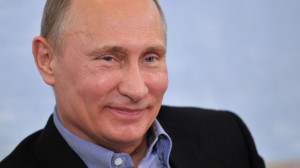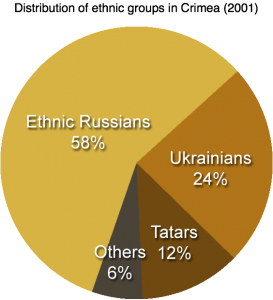13 May 2014
by Peter B. Gemma, National Executive Committee Member
 |
Russian President Putin’s claim that, “Crimea has always been an inseparable part of Russia,” is an uncomfortable assertion (for some), but as pundit Eric Margolis points out, “President Putin keeps bringing up history to justify his assertive policies towards Ukraine and Crimea. This annoys Americans, who know little about history and refuse to accept Russia as a great power — and certainly not as an equal.” |
First, the fundamentals. Catherine the Great formally absorbed Crimea, slightly smaller than Belgium, into the Russian empire in the 18th century. That’s when Russia’s strategically important Black Sea naval base at Sevastopol was built (it’s been operational ever since). In 1921, during the Russian revolution, the White Army controlled Crimea for a short time but it was quickly morphed into the Soviet Union. Crimea only became part of Ukraine when Soviet strongman Nikita Khrushchev, by an impulsive stroke of the pen, gave the peninsula to his native land in 1954. When the Soviet Union broke up in 1991, Crimea ended up inside an independent Ukraine, but as a formally autonomous region — specifically because its culture, history, and ethnic lines were far closer to Russia than Ukraine.
Vladimir Putin summed up the transition this way: “Millions of Russians went to bed in one country and woke up abroad. Overnight, they were minorities in the former Soviet republics, and the Russian people became one of the biggest — if not the biggest — divided nations in the world.”
While the central government of the Ukraine teetered financially in recent years and political unrest grew, Moscow took the bold initiative of backing the formidable Crimean underground in their attempt to set history right by re-aligning with Russia. That resulted in much finger pointing and shouted accusations of annexation by the West — but the precedent of nations declaring independence and unification with others is a long established option on the world stage.
While discussing Crimea, the State Department won’t incorporate the messy details of the Serbia/Montenegro/Kosovo entanglement, where the US and its allies forced borders to be created by ethnic divisions. The White House will not reference the occupation of Goa by India in 1961, nor will we even hear about the peaceful transitions of the People’s Republic of Zanzibar and Pemba merging to form Tanzania in 1964, or the
independent monarchy of Sikkim, where a majority of its subjects voted by plebiscite to become a state of India in 1975. Heck, America’s annexation of Hawaii in 1898 is a giant pineapple sitting in the foreign policy room. Apparently these are ancient historical facts that complicate the black and white arguments over Crimea.
| However Putin won’t ignore the past. He notes that NATO and the West thought Kosovo, with its Albanian majority, had to be split to protect minorities and establish political and economic stability. Putin reminded Western politicos of the, “well-known Kosovo precedent — a precedent our Western colleagues created with their own hands in a very similar situation, when they agreed that the unilateral separation of Kosovo from Serbia, exactly what Crimea is doing now, was legitimate and did not require any permission from the country’s central authorities.” Touché. |  |
As far as international law and diplomatic precedent, the Crimean vote to re-join Russia is in compliance with the UN International Court finding when making an advisory opinion on July 22, 2010 regarding Kosovo: “No general prohibition may be inferred from the practice of the Security Council with regard to declarations of independence,” and “General international law contains no prohibition on declarations of independence.”
Putin also brought to the table the US acknowledgment of April 17, 2009, given to the UN International Court in connection with the hearings on Kosovo: “Declarations of independence may, and often do, violate domestic legislation. However, this does not make them violations of international law.”
The facade of the world of nations siding with Washington on the Crimea question is thin. Although the US resolution “defending Ukraine’s territorial integrity” was adopted by the UN General Assembly, the tally was 100 members voting yes, but a significant minority, 69 countries, cast nay/abstain ballots — and the dissenters were made up of a variety of voices.
Nations that voted against the UN resolution or abstained include Brazil, South Africa, India, Jamaica, China, Iraq, Afghanistan, and Pakistan. Putin had this to say after the vote: “We are grateful to all those who understood our actions in Crimea. We are grateful to the people of China, whose leadership sees the situation in Crimea in all its historical and political integrity. We highly appreciate India’s restraint and objectivity.”
Argentinian President Cristina Fernandez de Kirchner stated that the West’s reaction is a double standard, noting that, “the UN Charter stipulates the right of people to self-determination, which means that this rule should be applied to all countries without any exception.”
Czech Republic leader Milos Zeman has said that the West should accept the fact that Crimea is now part of Russia, stressing that the former autonomous region won’t return to Ukraine in any foreseeable future. He described Nikita Khrushchev’s decision to give Crimea to the Ukraine as “stupid” and called the current situation “idiotic.”
Afghanistan President Hamid Karzai said, “We respect the decision the people of Crimea took through a recent referendum that considers Crimea as part of the Russian Federation.”
Closer to home, Americans are advising Washington not to get involved in Crimea. According to an April 21st Rasmussen Reports national survey, 58 percent of Americans want Washington to leave the situation alone.
Perhaps more telling, one poll revealed that about 84 percent of Americans couldn’t find Ukraine on a map — even 77 percent of college graduates failed to correctly point to Ukraine (which says a lot about public schools anddisinterest in Ukraine).
It’s time to give the devil his due and move on. Gregory Copley, editor of Defense and Foreign Affairs, puts it this way: “Crimea is now part of Russia, the West will come to terms with that, the question is how much longer they’ll perpetuate the crisis in the rest of Ukraine and whether they will escalate the problem, which I think will be unwise for the US and Western European interests.”
____
This article originally appeared at www.Unz.com, May 13, 2014